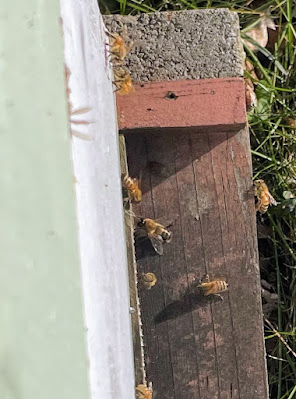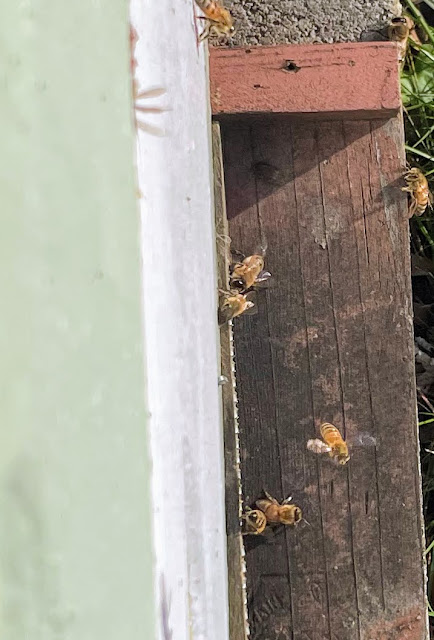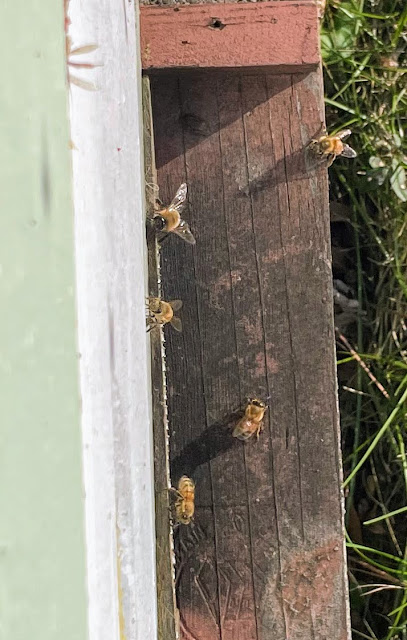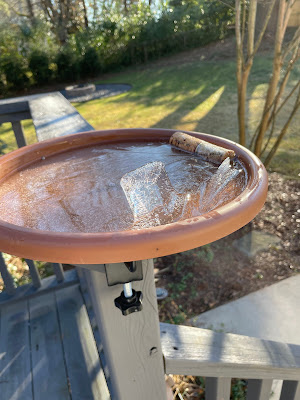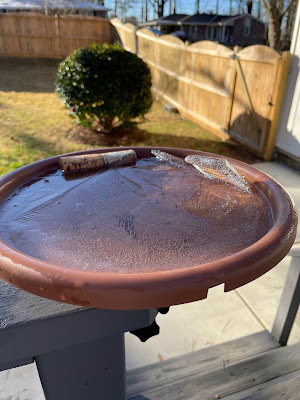I was looking at the photos from my earlier post today and discovered that there are drones flying in today's 56 degree temperature. I went out to the hives specifically to see the drones in person - not just in a photo that I took. Sure enough, I saw three drones enter each of my hives in a space of less than a minute. Here they are in all their Frida Kahlo glory - with their eyes looking just like her eyebrows:
This is the tale that began in 2006 in my first year of beekeeping in Atlanta, GA. ...there's still so much to learn.
Welcome - Explore my Blog
I began this blog to chronicle my beekeeping experiences. I have read lots of beekeeping books, but nothing takes the place of either hands-on experience with an experienced beekeeper or good pictures of the process. I want people to have a clearer picture of what to expect in their beekeeping so I post pictures and write about my beekeeping saga here.Master Beekeeper Enjoy with me as I learn and grow as a beekeeper.
Want to Pin this post?
Monday, January 31, 2022
There are drones flying from my hives on the last day in January
Bees are not supposed to fly until temp is above 50 degrees F
My bees continually defy that rule. Yesterday when it was about 44, they were out flying and having a great time.
Saturday, January 08, 2022
Water for bees all year - even in the winter
There are a lot of days in the south and all across the country, when, even though it's winter, the temperature is warm enough for bees to fly. And when it's warm enough, they will fly.
Our bees in Georgia have year round pollen sources so when it's warm enough to fly, the bees will be out, looking for camellia or whatever might be a winter-blooming plant. Every day that my bees fly, I see them flying into the hives with pollen on their legs.
The other thing they are looking for is water. This year I'm in a new house (old, but new to me!) and have set up bird feeders. I also put a bird bath on my deck railing. I see birds in it on every sunny day. Because I know that bees can't swim, I have floated two corks in the bird bath to give the bees a landing place. I'll add a few more as a few more bottles of wine are opened.
The other night on January 4, our temperatures dropped to the 20s and in the morning, my bird bath looked like Lake Michigan in the winter:
Monday, January 03, 2022
MABA Short Course is January 29 by Zoom
Given the ongoing presence of the COVID virus, the Metro Atlanta Beekeepers is again offering our short course via Zoom. To register, click here.
The advantage of our course being on Zoom is that anyone anywhere can take it! If you are in the Metro area, your fee for the course includes a one year membership to MABA. But if you are from a different area, we will contribute $35 to your bee club of choice if you don't live in the Atlanta area to cover the dues you would have to pay at your own club for a year.
I'm biased because I'm one of the chairs of the course and teach in it, but we have three master beekeepers teaching in our course: Bobby Chaisson, Julia Mahood and me. Also each of us has been GBA Beekeeper of the year - actually Julia in 2018, Bobby in 2019, and me in 2020! Jennifer Berry from the UGA bee lab teaches in our course and we have videos from Cindy Bee, whom many of you know, and from Dr. Keith Delaplane of the UGA bee lab. Kathy Bourn is editor of the GBA Newsletter and Jimmy Gatt is an expert on trees for bees. When we offer the course in person, we typically have over 100 people every year.
Here's the program for the course:
